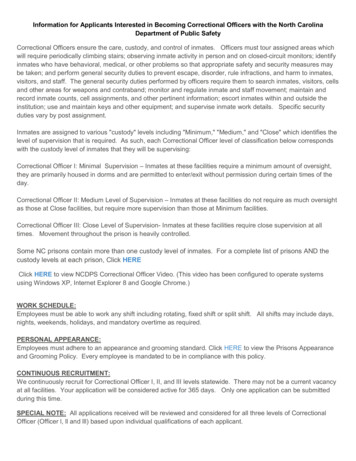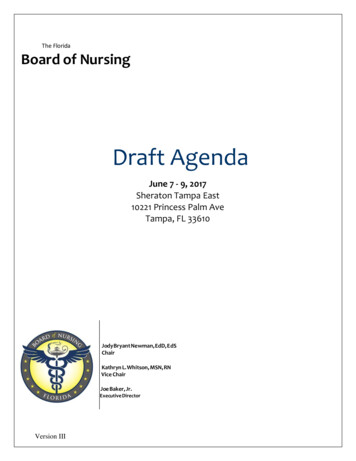
Transcription
Information for Applicants Interested in Becoming Correctional Officers with the North CarolinaDepartment of Public SafetyCorrectional Officers ensure the care, custody, and control of inmates. Officers must tour assigned areas whichwill require periodically climbing stairs; observing inmate activity in person and on closed-circuit monitors; identifyinmates who have behavioral, medical, or other problems so that appropriate safety and security measures maybe taken; and perform general security duties to prevent escape, disorder, rule infractions, and harm to inmates,visitors, and staff. The general security duties performed by officers require them to search inmates, visitors, cellsand other areas for weapons and contraband; monitor and regulate inmate and staff movement; maintain andrecord inmate counts, cell assignments, and other pertinent information; escort inmates within and outside theinstitution; use and maintain keys and other equipment; and supervise inmate work details. Specific securityduties vary by post assignment.Inmates are assigned to various "custody" levels including "Minimum," "Medium," and "Close" which identifies thelevel of supervision that is required. As such, each Correctional Officer level of classification below correspondswith the custody level of inmates that they will be supervising:Correctional Officer I: Minimal Supervision – Inmates at these facilities require a minimum amount of oversight,they are primarily housed in dorms and are permitted to enter/exit without permission during certain times of theday.Correctional Officer II: Medium Level of Supervision – Inmates at these facilities do not require as much oversightas those at Close facilities, but require more supervision than those at Minimum facilities.Correctional Officer III: Close Level of Supervision- Inmates at these facilities require close supervision at alltimes. Movement throughout the prison is heavily controlled.Some NC prisons contain more than one custody level of inmates. For a complete list of prisons AND thecustody levels at each prison, Click HEREClick HERE to view NCDPS Correctional Officer Video. (This video has been configured to operate systemsusing Windows XP, Internet Explorer 8 and Google Chrome.)WORK SCHEDULE:Employees must be able to work any shift including rotating, fixed shift or split shift. All shifts may include days,nights, weekends, holidays, and mandatory overtime as required.PERSONAL APPEARANCE:Employees must adhere to an appearance and grooming standard. Click HERE to view the Prisons Appearanceand Grooming Policy. Every employee is mandated to be in compliance with this policy.CONTINUOUS RECRUITMENT:We continuously recruit for Correctional Officer I, II, and III levels statewide. There may not be a current vacancyat all facilities. Your application will be considered active for 365 days. Only one application can be submittedduring this time.SPECIAL NOTE: All applications received will be reviewed and considered for all three levels of CorrectionalOfficer (Officer l, ll and lll) based upon individual qualifications of each applicant.
SALARY INFORMATION:. Please note that if there are no fully qualified candidates for the Correctional Officer IIor Correctional Officer III positions, management may consider trainee candidates. Candidates must possessHigh School or General Educational Development (GED) diploma or an equivalent combination of education andexperience, and must be eligible for certification by the NC Criminal Justice Education and Training StandardsCommission. Trainees must successfully meet all requirements in order to move up to the fully qualifiedCorrectional Officer II or Correctional Officer III job classification. Trainee salaries will be less than that of thoseemployees who are fully qualified. The pay is adjusted when the employee is fully qualified (see below chart):Correctional Officer I 30,856 annual starting salaryCorrectional Officer II 30,856 (trainee - with no experience) 32,703 (fully qualified with 12 months experience)Correctional Officer III 30,856 (trainee with no experience) 32,703 (trainee with 12 months experience) 34,190 (fully qualified with 24 months experience)Minimum Education and Experience RequirementsCorrectional Officer I: High School Diploma/GED from accredited school or equivalent combination ofeducation and experience.Correctional Officer II: High School Diploma/GED from accredited school and one-year experience asCorrectional Officer; or equivalent combination of education and experience.Correctional Officer III: High School Diploma/GED from accredited school and two years' experience asCorrectional Officer; or an equivalent combination of education and experience.EQUIVALENT COMBINATIONS OF EDUCATION AND EXPERIENCE:An equivalent combination of the education and experience listed below may be considered to meet the minimumeducation and experience requirements (above) for the Correctional Officer II and Correctional Officer IIIpositions. Associate Degree in any field Bachelor's Degree in any field Military experience (no dishonorable discharge, one year of full-time military service is equal to one year ofexperience) Probation/Parole Officer (PPO) Any sworn law enforcement or juvenile detention experience at the federal, state, county, or municipal level Correctional Officer within North Carolina or from another state County Jailor Municipal Police Officer Deputy Sheriff Detention Officer Federal Correction Officer Special Officer (Certified Police Officer) i.e., Hospital Police Related criminal justice or law enforcement rolesThis is not an exhaustive list, other experience may be applied therefore it is important that you complete allportions of the application.
It is important that your application include all relevant education and experience in the Education andWork Experience sections of the application form. Embedded or attached resumes ARE NOT accepted asa substitution for a completed application.OTHER REQUIREMENTS:· Must be at least 20 years of age and a citizen of the United States.· Must be eligible for certification by the NC Criminal Justice Education and Training StandardsCommission. See specific certification requirements at the end of this document.· Must possess a valid driver's license.· As part of the Criminal Justice Background investigation process, applicants with military experiencemust submit an unaltered copy of the DD-214, Report of Separation (long form) along with theirapplication. Applicants seeking Veteran's Preference must attach a DD-214.· Applicants in the National Guard must also submit Form NGB-23A.· Pass Psychological testing as required by NC Criminal Justice Education and Training StandardsCommission.· Pass Physical Examination as required by NC Criminal Justice Education and Training StandardsCommission.· Pass Drug Screening as required by NC Criminal Justice Education and Training StandardsCommission. Attend and successfully complete (4) weeks of Basic Correctional Officer Training (BCOT) at a TrainingFacility. Employees shall be scheduled for BCOT during their 2nd week of employment. Pass Correctional Officer Physical Abilities Test (COPAT): Click HERE to watch a COPAT videoshowing physical requirements you must be able to pass. COPAT will be administered at during BasicTraining. Correctional Officers will have three (3) attempts to pass within ten (10) months of when theyare hired.The Employment Screening ProcessDue to the number of steps involved in the screening process, the amount of information gathered andverified, the entire process from initial application to final offer of employment may take 60 to 90 days. Ifpaperwork is not completed, if appointments are missed and rescheduled, if assessments are notcompleted in a timely manner, the process may take longer. Below is a brief description of theEmployment Screening process.1. All applications received are immediately screened to verify: The applicant is at least 20 years of ageThe applicant has a high school diploma or the equivalency of a HS diplomaThe applicant possesses a valid driver's licenseU.S. Citizenship
2. Next, a criminal background check is conducted. If the applicant has prior law enforcement or criminaljustice experience, a reference check is also conducted with the previous employer. If the results ofthese reviews are favorable, the applicant will be contacted for an interview at one of the RegionalOffices. In some cases, interviews will be held at one of the prisons.3. If the results of the interview are favorable, the applicant shall meet with a Prisons representative todiscuss “next steps” in the hiring process, go over policies, select a work location and finally receive a“Conditional Offer of Employment” (COE). Next, if selected to move forward in the hiring process, theapplicant shall meet with a Regional Employment Office (REO) representative for clarification on anyissues revealed during the criminal background check, and for completion of required employment andcriminal justice certification paperwork.4. Applicant must complete on-line assessments and personal history statements either at the regionaloffice or at home. Applicant will then be scheduled to meet with the agency's medical provider to have amedical examination, psychological evaluation, drug screening, and TB screening (as applicable).5. If testing results are favorable and applicant meets all agency and Criminal Justice Standardsrequirements, the applicant will be contacted by a Prisons representative to establish a start date foremployment and a date to begin orientation and the four-week Basic Correctional Officer Training(BCOT) class.If results are unfavorable, the applicant will be notified that the conditional offer of employment has beenrescinded and a reason will be provided.6. Once the start date is established, the applicant will be contacted by the prison facility where they will beworking to schedule a time for the applicant to pick up uniforms and shoes.7. New Correctional Officers will be paired with a seasoned officer for three weeks of on the job training.8. Below is a brief look at what the first eight weeks as a new Correctional Officer will entail:
Additional Information on the Basic Correctional Officer Training ProgramTRAINING SCHEDULEShould you meet all agency requirements and receive a final offer of employment and report date, you will bescheduled to attend a four (4) week Basic Correctional Officer Training class to begin the second week of youremployment with the Department of Public Safety. Please be prepared to stay overnight in a dormitory at thetraining academy during this four (4) week training period.Basic Correctional Officer Training Classes are conducted by Division of Adult Correction and Juvenile Justice,Office of Staff Development and Training (OSDT) certified instructors.Classes begin at 8:00am and end at 5:00pm. Trainees must be on time for all classes. There are no approvedabsences.Trainees must successfully complete the required 160 hours (4 weeks) to sit for the state exam. A score of 70% isrequired on the final exam to be certified by the North Carolina Criminal Justice Education and Training StandardsCommission.A Correctional Officer Physical Abilities Test (COPAT) will be administered during Basic Training. Employees areallowed three (3) attempts to pass COPAT within the first ten (10) months of employment. You must successfullycomplete COPAT as a condition of continued employment.ORIENTATIONTrainees must report to the assigned training center/academy on a Sunday and must be in duty uniform. OSDTprovides student handouts and notebook; however, you must provide your own pens/pencils and paper for notetaking.DRESS CODEDPS policy on personal grooming, hair regulations, finger nails, ear rings, body piercing and other jewelry will beenforced while you are assigned to Basic Training. Your duty uniform will be worn every day for class. Improperwearing of the uniform may result in disciplinary action, up to and including dismissal.CONDUCTYou will be required to comply with a "no alcohol" policy and professional rules of conduct. Cell phones, cameras,and/or recording devices are not allowed in any building, classroom, gymnasium, or firing range where training isbeing conducted. Failure to comply with rules of conduct could result in immediate separation from training,disciplinary action, up to and including dismissal.NC Criminal Justice Certification StandardsBelow is a listing of the factors that may lead to disqualification from the process based on standards developedby the NC Criminal Justice Education and Training Commission.Under 12 NCAC 9G .0200, every person employed as a Corrections Officer shall: Be examined and certified by a licensed physician, physician's assistant, or nurse practitioner to meet thephysical requirements to properly fulfill the officer's particular job responsibilities; Be administered a psychological screening examination by a clinical psychologist or psychiatrist licensedto practice in North Carolina to determine the officer's mental and emotional suitability to properly fulfill theofficer's particular job responsibilities; Be of good moral character as evidenced by, but not limited to:
ooNot having been convicted of a felony;not having been convicted of a misdemeanor as defined in 12 NCAC 9G .0102(9) for three (3)years since the date of conviction or the completion of any corrections supervision imposed by thecourts, whichever is later;onot having been convicted of an offense that, under 18 U.S.C. 922 (1996), and all subsequentamendments partl-chap44-sec922.pdf),would prohibit the possession of a firearm or ammunition; Having submitted to and produced a negative result on a drug test within 60 days of employment or anyin-service drug screening required by the Department of Public Safety, Division of Adult Correction andJuvenile Justice that meets the certification standards of the Department of Health and Human Servicesfor Federal Workplace Drug Testing Programs; Submitting to a background investigation consisting of:ooooverification of age;verification of education;a criminal history check of local, state, and national files; andbeing truthful in providing all required information to the Department of Public Safety, Divisionof Adult Correction and Juvenile Justice and to the Criminal Justice Standards Division for thepurpose of obtaining probationary or general certification.
Correctional Officer II or Correctional Officer III job classification. Trainee salaries will be less than that of those employees who are fully qualified. The pay is adjusted when the employee is fully qualified (see below chart): Correctional Officer I. 30,856 annual starting salary . Correctional Officer II . 30,856 (trainee - with no .











